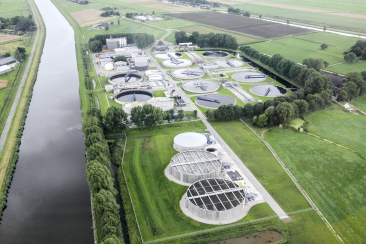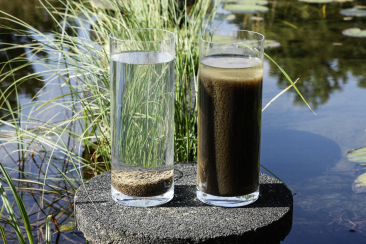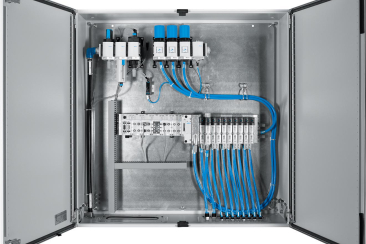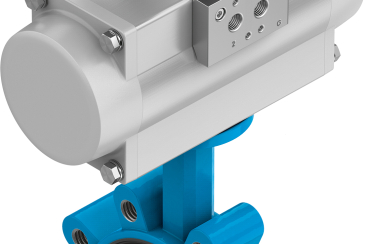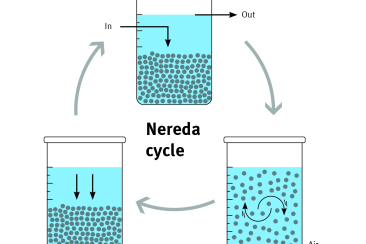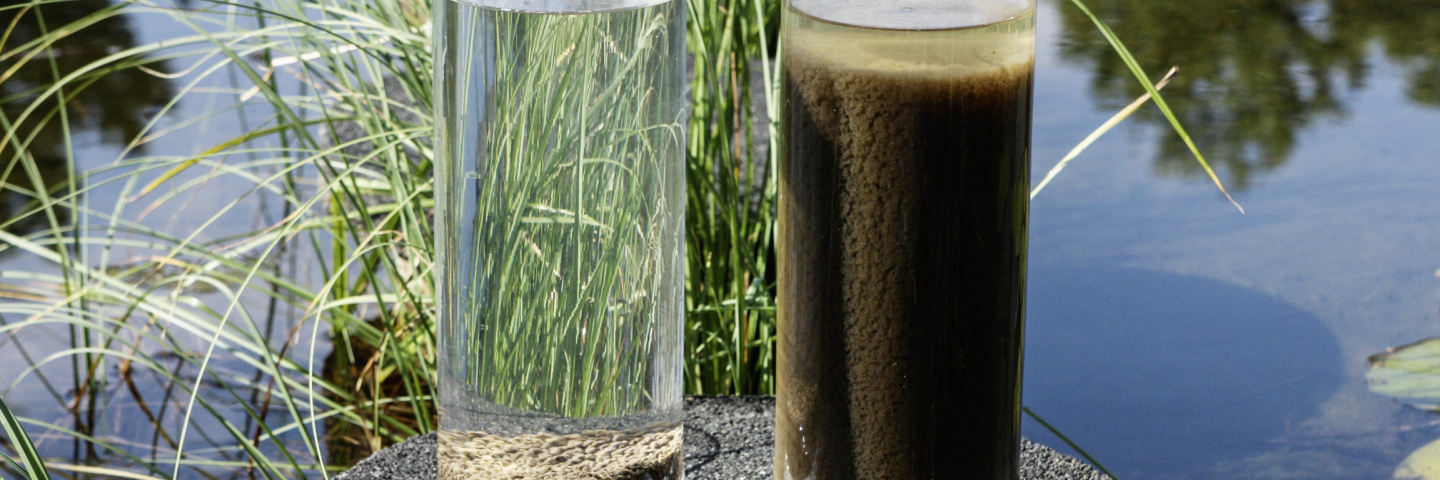
Nereda® technology for footprint and energy savings
The Nereda technology is the new standard for the sustainable and cost-effective biological treatment of municipal and industrial wastewater. What makes the Nereda process unique is the fact that the bacteria used to purify the wastewater grow into granules with fast settling properties. All biological treatment processes take place simultaneously in these granules. The first industrial plant commenced operation in 2005, followed by the first municipal plant in 2009. By 2020, more than 80 Nereda plants were in operation or planning worldwide.
Three stages in one reactor
The Nereda technology is based on a simple cyclical process with three stages, which can take place in one or more Nereda reactors. The duration and the process parameters for the various stages of each cycle are automatically adjusted, even when the quantity, composition and temperature of the wastewater fluctuate. In the first stage, the untreated wastewater is fed. While this is happening, the treated water is displaced and decanted. The second stage is the aeration phase, during which the organic, nitrogen and phosphorous compounds are removed biologically. In the fast settling phase, the biomass is separated from the wastewater and the Nereda plant is ready for a new cycle.
The Nereda technology combines all biological treatment processes in just one tank. This requires an exact process sequence. The sedimentation rate in the Nereda process is up to thirty times faster than in conventional plants. The process steps, some of which are very short, require fast-closing process valves – this is where pneumatic automation from Festo offers the right solutions.
Automation and digitalisation
Festo provides support with the design of the overall pneumatic system as well as with installation and commissioning. For the compressed air supply, the company supplies turnkey solutions with control cabinets, compressors, tubing and accessories, all available worldwide and from a single source. Compressed air monitoring ensures efficient and stable processes. A warranty for the overall system in the form of a maintenance agreement offers the wastewater treatment plant operator the certainty they need. Digitalisation, for example with the Festo Motion Terminal, provides added value and transparency.
The Festo Motion Terminal VTEM is the world’s first valve to be controlled using apps. The Motion Apps make it possible to integrate many functions in one standardised hardware device. Users can easily change functions at the touch of a button. Thanks to integrated sensors the Motion Terminal is also capable of self-learning and autonomous adaptation.
Motion Apps and energy efficiency module
Suitable apps for applications in wastewater treatment plants based on the Nereda process include “ECO drive” for saving compressed air, “Presetting of travel time” for setting opening/closing times and “Leakage diagnostics” for detecting malfunctions. With the app “ECO drive”, an actuator is operated with the minimum pressure needed for the load. This saves significant amounts of compressed air, particularly with large actuators. With the app “Presetting of travel time”, the duration of the working stroke is not defined by adjusting flow control valves, but simply by entering a time in seconds. With the app “Leakage diagnostics”, malfunctions can be detected and pinpointed to a specific actuator via diagnostic cycles and defined threshold values.
Other modules for the digitalised energy-saving concept are the energy efficiency modules MSE6, which combine pressure regulator, on/off valve, sensors and fieldbus communication in one unit. They monitor the compressed air consumption, automatically shut off the compressed air after production has stopped for a certain amount of time
and prevent the system pressure from falling below a specific stand-by pressure level. Thanks to this patented technology from Festo, plant operators can save several metric tons of CO2 and hundreds of euros in operating costs per year.
Control cabinets and process valves
The ready-to-install control cabinet solutions offered by Festo protect the decentralised automation components, such as the valve terminal VTSA, against external influences. The VTSA ensures the high flow rates needed for controlling large-volume actuators, while the electrical terminal CPX provides function integration such as pressure monitoring as well as digital or analogue inputs and outputs. Also included in the control cabinets is the MS series modular compressed air preparation unit with configuration options such as pressure regulation and tamper protection.
Pre-assembled process valve units ensure that the components optimally match one another, make installation easier and give you planning certainty, even in the case of customer-specific solutions. A perfectly sized compressed air network is crucial for energy-efficient plants. At Festo, users get everything from a single source, from the compressor and air preparation (e.g. dryer) right up to an extensive selection of tubing and connectors – combined of course with advice from experts.
About Nereda:
Nereda® is the trademark for proprietary technology owned by Royal HaskoningDHV. For more information on the Nereda technology, please visit https://www.nereda.net.
Festo is a global player and an independent family-owned company with headquarters in Esslingen am Neckar, Germany. Festo has set standards in industrial automation technology and technical education ever since its establishment, thereby making a contribution to sustainable development of the environment, the economy and society. The company supplies pneumatic and electrical automation technology to 300,000 customers of factory and process automation in over 35 industries. Digitalization, AI and the LifeTech sector with medical technology and laboratory automation are becoming increasingly important. The products and services are available in 176 countries. With about 20,600 employees in over 250 branch offices in around 60 countries worldwide, Festo achieved a turnover of around €3.45 billion in 2024. More than 8% of this turnover is invested in research and development. In this learning company, 1.5 % of turnover is invested in basic and further training. Festo Didactic SE is a leading provider of technical education and training and offers its customers worldwide comprehensive digital and physical learning solutions in the industrial environment.


